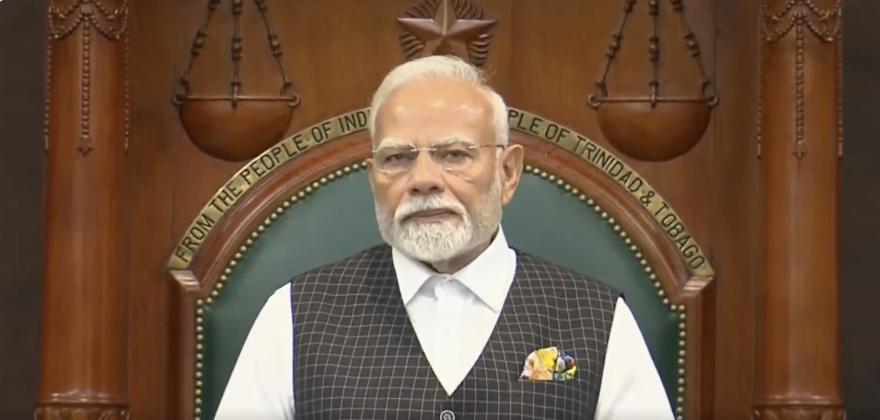
Glad to See So Many Women MPs: PM in Trinidad & Tobago Parliament
In a heartwarming gesture, Prime Minister Narendra Modi recently addressed the joint assembly of Trinidad and Tobago’s parliament, where he expressed his delight at seeing a significant number of women MPs. This statement is a testament to the growing importance of women’s participation in politics and governance, not only in India but globally.
During his address, PM Modi emphasized the significance of respecting women, stating that it is deeply rooted in Indian culture. He further highlighted his government’s efforts to empower women and strengthen them to build a modern India. This sentiment is in line with the Indian government’s initiatives to promote women’s empowerment and gender equality.
The Prime Minister’s statement has sparked a renewed conversation about the role of women in politics and governance. In recent years, there has been a significant increase in the number of women entering politics, breaking glass ceilings and shattering stereotypes. This trend is not limited to India alone; women are making a mark in politics across the world, from the United States to Europe and Asia.
According to a recent report by the Inter-Parliamentary Union (IPU), women now hold around 25.6% of the seats in national parliaments worldwide, a significant increase from the 11.3% in 1995. This growth is largely attributed to the increasing awareness about the importance of gender equality and the need for women’s participation in politics.
In India, the number of women MPs has also seen a significant increase. According to the 2019 Lok Sabha elections, women made up around 14% of the total MPs, with 78 women elected to the Lok Sabha. This is a significant jump from the 1996 elections, where only 7% of the total MPs were women.
The Indian government has taken several initiatives to promote women’s participation in politics. One such initiative is the ” Beti Bachao, Beti Padhao” (Save the Girl Child, Educate the Girl Child) campaign, which aims to address the declining child sex ratio and promote education among girls. The government has also launched several programs to empower women, including the “Ujjawala” scheme to combat human trafficking and the “SwaSahayog” scheme to promote women’s participation in self-help groups.
The Prime Minister’s statement has also sparked a conversation about the importance of respecting women. In India, women have traditionally played a significant role in family and community life, but often face discrimination and harassment. The #MeToo movement, which gained momentum in 2018, highlighted the widespread prevalence of sexual harassment and assault against women.
The Indian government has taken several initiatives to combat gender-based violence. The “Protection of Children from Sexual Offences (POCSO) Act” aims to protect children from sexual abuse, while the “Prevention of Sexual Harassment of Women at Workplace (POSH) Act” aims to prevent sexual harassment in the workplace. The government has also launched several awareness campaigns to promote gender sensitivity and respect for women.
In conclusion, PM Modi’s statement about being delighted to see so many women MPs in Trinidad and Tobago’s parliament is a significant step forward in promoting women’s participation in politics and governance. The Indian government’s initiatives to empower women and promote gender equality are a testament to the country’s commitment to women’s rights and empowerment.
As women continue to break glass ceilings and shatter stereotypes, it is essential to recognize their contributions and provide them with equal opportunities to succeed. The Prime Minister’s statement is a reminder that women’s empowerment is not only a moral obligation but also essential for building a modern and progressive society.



